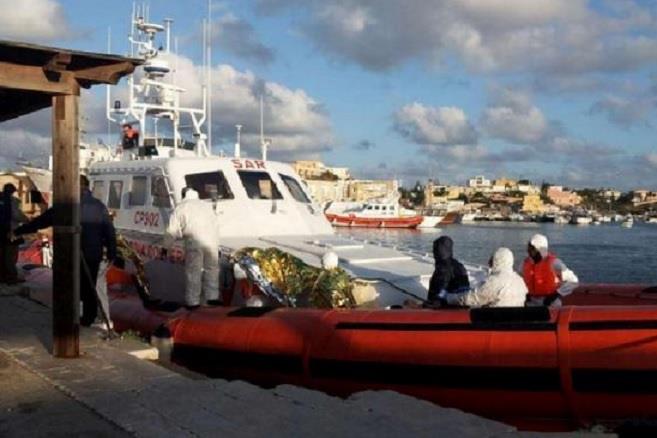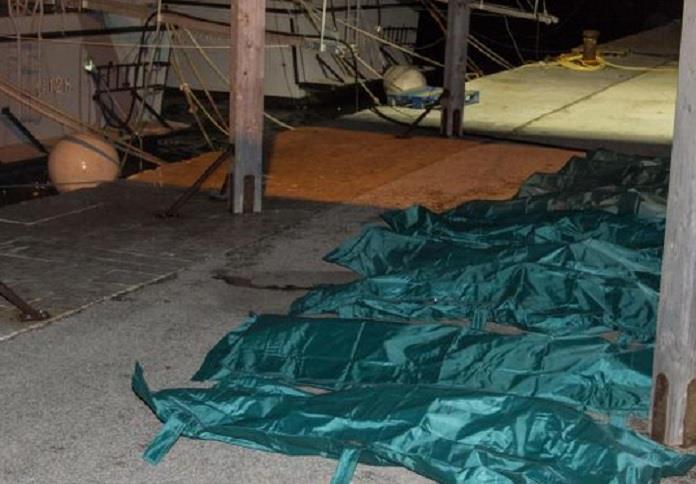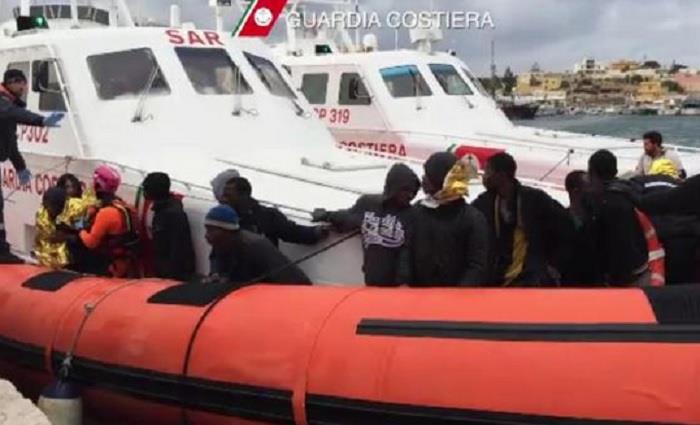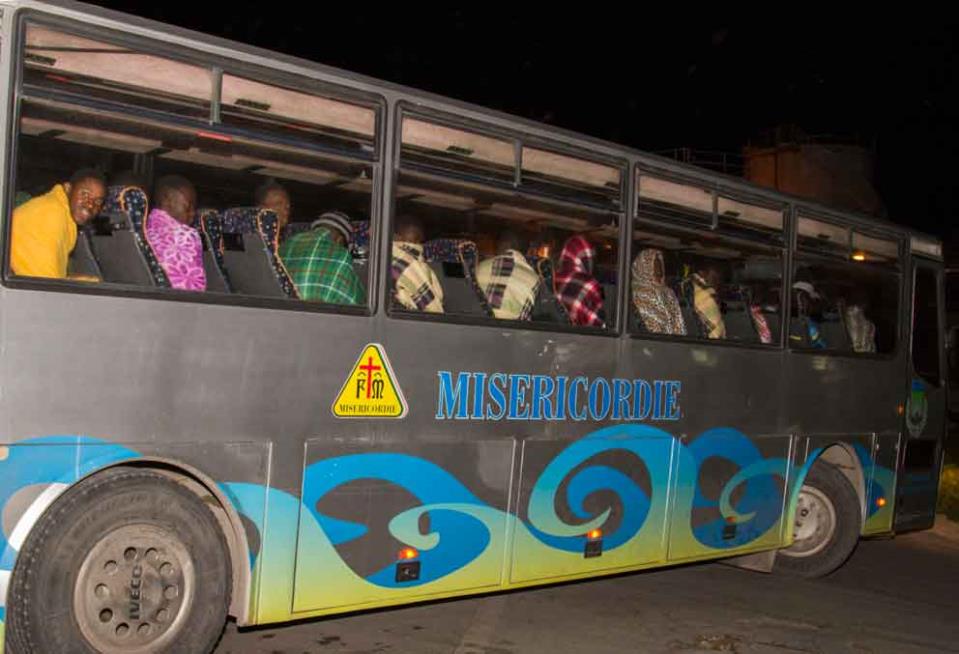Some 300 migrants who tried to cross the frigid Mediterranean in open, rubber boats, were reported missing Wednesday by survivors as the U.N. refugee agency and other aid groups sharply criticized the new EU rescue operation as insufficient and costing lives.
The suspected deaths add to the 29 reported earlier in the week by the Italian coast guard, which said those victims had died of hypothermia during the voyage that began over the weekend in Libya, where most smuggling operations originate.
The U.N. High Commissioner for Refugees said survivors had reported that four boats had left together, without food or water, and that the boats began taking on water almost immediately. Some 107 people had been rescued by the Italian coast guard and a merchant ship. The agency's spokeswoman in Italy, Carlotta Sami, said the victims had been "swallowed up by the waves," the youngest a child of 12.

The nationalities of the survivors and those missing were not immediately given, but a large proportion of those arriving at the moment are fleeing conflicts in Iraq, Syria, Mali and elsewhere.
UNHCR, Save the Children, Amnesty International and other aid groups blasted the new EU-backed rescue patrol as insufficient for the task at hand. The European Union took over Mediterranean patrols after Italy phased out its robust Mare Nostrum operation in November. Mare Nostrum (Our Seas) had been launched in 2013 after 360 migrants drowned off the coast of the Sicilian island of Lampedusa.
But the EU's Triton mission only operates a few miles off Europe's coast — its job is to patrol Europe's borders — whereas Mare Nostrum patrols took Italian rescue ships up close to Libya's coast.
"The Triton operation doesn't have as its principal mandate saving human lives, and thus cannot be the response that is urgently needed," Laurens Jolles, the head of the U.N. agency for southern Europe, said in a statement.

Save The Children called for the EU to urgently meet to restart Mare Nostrum "or another rescue system that has the mandate, the capacity and means to prevent other tragedies."
The spokeswoman for the European Commission, Natasha Bertaud, said the Triton operation operated by the EU's Frontex border agency cannot possibly do the job with Frontex's 90-million-euro ($101.67 million) total annual budget. Mare Nostrum, which just patrolled the southern Mediterranean, cost Italy 9.5 million euros a month to operate.
"Pointing fingers is not going to get us anywhere," Bertaud said in Brussels. "If we want to talk seriously about improving the situation then we also need to talk about financing it adequately."

The commission is currently conducting a feasibility study into whether a border guard system would be worthwhile, with the first discussions expected to begin next month.
The U.N. and other rescue organizations have long said the EU mission would result in lost lives since the patrols are so far from Libya's coast. Critics of Mare Nostrum, though, had said the Italian patrols so close to Libya only encouraged migrants to take the risk.

The UNHCHR says the recent deaths confirm that there is no deterrent effect from a less-robust operation. In January, 3,528 migrants reached Italy, up by two-thirds from 2,171 in the first month of 2014, a year that brought 170,100 migrants to Italy's shores.
Italian Foreign Minister Paolo Gentiloni, speaking on Sky TG24, said the aim should be to "Europeanize" the Mare Nostrum operation and "not take a step back in our humanitarian commitment or ability to confront the problem."
In his weekly general audience Wednesday, Pope Francis called for more solidarity "so that no one is left without the necessary rescue."

In the meantime, MOAS Director Brigadier (ret’d) Martin Xuereb warned today that 2015 could see a record number of migrant deaths in the Mediterranean.
The director of the Migrant Offshore Aid Station said Monday’s events marked the beginning of a deadly 2015. “This tragedy is a stark reminder of two crucial points. Firstly, migrant crossings are continuing through winter despite rough seas and dire weather conditions. Secondly, without Italy’s rescue mission Mare Nostrum, search and rescue in the Mediterranean is inadequate. The restricted Frontex mission effectively takes the situation back to what it was in October 2013 when hundreds of migrants died preventable deaths. It is actually worse, because we are only now feeling the full impact of the displacement of people from Syria and other conflict zones.”
MOAS warned that the reduced search and rescue efforts by the EU and its member states effectively placed a bigger burden on the commercial, military and civilian boats which may be ill-equipped and unprepared to deal with search and rescue effectively. “The most tragic element of this latest disaster is that the migrants died after they had been rescued, many from hypothermia due to being exposed on deck,” Brig. Xuereb added.
Brigadier Xuereb said Monday’s tragedy showed that migrants are not really encouraged to cross the Med by the presence of rescue boats. “Migrants are being pushed to leave their homes, not pulled towards Europe. They are getting onto boats in rough seas and freezing weather, knowing that the rescue missions have stopped. This is their last resort.”
Last year, 3,419 men, women and children died while making the dangerous crossing to Europe in unseaworthy boats, mostly by drowning or dehydration.

Another tragedy that should have been avoided
Anne Brasseur, President of the Parliamentary Assembly of the Council of Europe (PACE) said today: “I am appalled by the news of over 300 migrants feared dead in the Mediterranean. My thoughts are with the families of the victims. This is another tragedy that should have been avoided by all means. These deaths, which follow those of 29 migrants who died of hypothermia, put into question the decision to end the full-scale search-and-rescue mission Mare Nostrum in 2014.”
“Last year, a record of 170,000 irregular migrants, asylum seekers and refugees crossed the Mediterranean sea into Europe and more than 3,400 people died while taking this dangerous route in ill-equipped boats. Current trends show that the volume of irregular migration in 2015 is outpacing that of last year: according to UNHCR, the number of persons arriving by sea in January 2015 increased by 60% by contrast to the same month in 2014, when Mare Nostrum was in place. I invite European governments to reaffirm their solidarity by putting in place a more effective and well-resourced European search and rescue initiative, creating alternative migration possibilities and increasing efforts to combat smuggling.
As Pope Francis said while addressing the European Institutions in Strasbourg last November “there needs to be a united response to the question of migration. We cannot allow the Mediterranean to become a vast cemetery”. It is a question of life or death and all European states must stand in solidarity with countries of origins, Southern Mediterranean countries, and all those who are forced to flee conflict and persecution,” Ms Brasseur declared.
Photos tgcom and AP